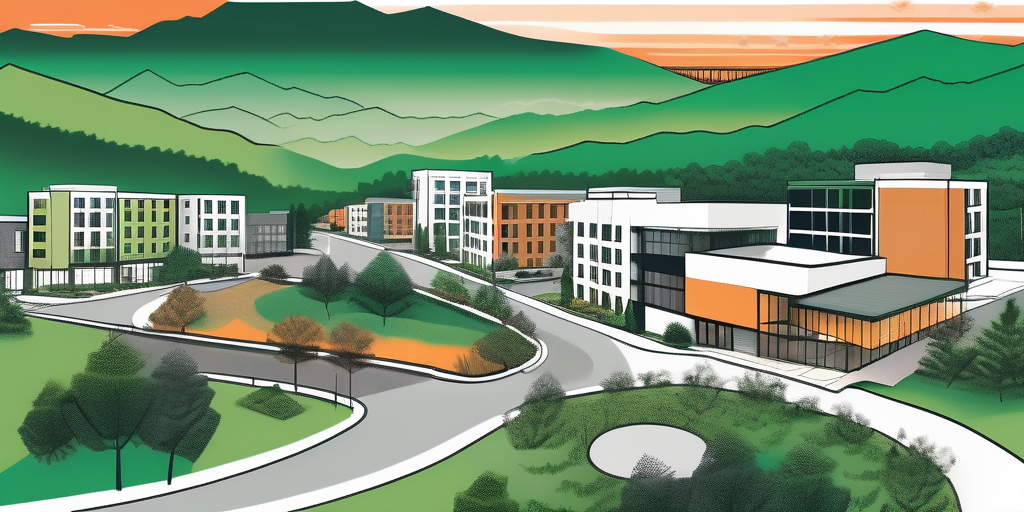
As we step into 2024, the landscape of Tennessee real estate development is evolving at a brisk pace. With a combination of economic factors, emerging trends, and specific opportunities, understanding this vibrant market is crucial for investors, developers, and homebuyers alike.
Before diving into the trends and opportunities, it’s vital to grasp the current landscape of real estate in Tennessee. The state has experienced significant growth, attracting businesses and residents alike. Cities like Nashville, Memphis, and Chattanooga are at the forefront of this development boom, creating a dynamic and competitive market. The influx of new residents is not just a result of economic opportunities; it is also fueled by Tennessee's vibrant culture, rich history, and natural beauty, making it a desirable place to live and work.
The economy plays a pivotal role in shaping the real estate market. Tennessee's economy has shown resilience with a diverse blend of industries, including healthcare, manufacturing, and tourism. This economic stability attracts investors and encourages residential and commercial development. Additionally, the state's strategic location, with major highways and railroads, facilitates trade and transportation, further enhancing its appeal to businesses looking to establish a foothold in the region.
Moreover, favorable interest rates have been encouraging for potential homeowners and investors, making it an attractive time to dive into the market. However, vigilance is key, as economic shifts can rapidly affect the landscape. The ongoing changes in remote work dynamics have also influenced housing demand, with many seeking larger homes in suburban areas, leading to a surge in new developments outside urban centers.
In Tennessee's real estate scene, a variety of players contribute to the development process. From local developers and real estate agents to investors and government officials, collaboration is essential. Each entity plays a role in shaping the property landscape through strategic initiatives and long-term visions. Real estate agents, in particular, are invaluable in navigating the complexities of the market, providing insights into neighborhood trends and helping clients make informed decisions.
Local governments also significantly impact the market by implementing policies that support growth and development. Understanding these key players and their motivations can provide insights into future opportunities. Furthermore, community organizations and non-profits are increasingly involved in advocating for affordable housing and sustainable development practices, ensuring that growth benefits all residents. This collaborative approach not only fosters a sense of community but also addresses pressing issues such as housing equity and environmental sustainability, which are becoming increasingly important in urban planning discussions.
As we look ahead, several exciting trends are shaping Tennessee's real estate development. Recognizing these trends can help investors and developers align their strategies with market demands.

Sustainability has become a crucial focus in real estate development. With increasing awareness of environmental issues, developers are turning to sustainable building practices. In Tennessee, there's a noticeable shift towards the construction of green buildings that utilize energy-efficient designs and sustainable materials.
This trend not only appeals to environmentally conscious buyers but can also lead to long-term savings on energy costs. Developers who embrace sustainability are likely to gain a competitive edge in the market. Additionally, many local governments are incentivizing green building practices through tax credits and grants, further encouraging developers to adopt eco-friendly methods. As a result, we are witnessing a growing number of LEED-certified projects across the state, which not only contribute to a healthier environment but also enhance the overall aesthetic appeal of neighborhoods.
Technology is revolutionizing the real estate industry. From virtual reality tours to smart home technology, the integration of tech is transforming how properties are marketed and sold. Developers are increasingly adopting these advanced technologies to enhance the buyer experience.
Moreover, property management is becoming more streamlined with the use of software for tracking maintenance requests and tenant communication. This tech-savvy approach can improve operational efficiency and ultimately elevate tenant satisfaction. Furthermore, the rise of big data analytics is allowing developers to make informed decisions based on market trends and consumer preferences. By leveraging data, developers can identify high-demand areas and tailor their projects to meet the specific needs of potential buyers, ensuring that new developments are not only innovative but also strategically positioned for success in the competitive Tennessee market.
For investors and developers, Tennessee presents a plethora of opportunities across various sectors. Recognizing where to invest can lead to lucrative returns.

Commercial real estate in Tennessee is booming, particularly in urban areas where businesses are setting up shop. Nashville’s burgeoning tech scene and Memphis's logistics base present significant opportunities for investment.
With an influx of companies and a growing workforce, demand for office spaces and retail units is soaring. Investors who act quickly to secure properties in these high-demand areas may reap substantial benefits.
Moreover, the state is witnessing a significant trend in mixed-use developments that combine residential, commercial, and recreational spaces. This approach not only attracts diverse demographics but also enhances community engagement. As cities like Chattanooga and Knoxville invest in revitalizing their downtown areas, the potential for high returns on mixed-use projects becomes increasingly apparent. Investors who can identify and capitalize on these trends may find themselves at the forefront of Tennessee's evolving real estate landscape.
Residential real estate in Tennessee is not to be overlooked. With a steady influx of new residents seeking a more laid-back lifestyle, suburban and rural areas are experiencing a surge in demand.
Furthermore, the housing market is adapting to cater to younger generations who prioritize walkability, accessibility, and community amenities. Developers that align their projects with these preferences are likely to find strong demand for their properties.
In addition, Tennessee's favorable cost of living compared to neighboring states makes it an attractive destination for families and retirees alike. As more people seek affordable housing options without sacrificing quality of life, the demand for single-family homes, townhouses, and condominiums continues to rise. Innovative builders who incorporate sustainable practices and energy-efficient designs into their developments are also gaining traction, appealing to environmentally conscious buyers. This shift not only enhances the marketability of properties but also positions developers as leaders in a growing niche that values sustainability and modern living.
Despite the many opportunities, prospective investors and developers must navigate a series of challenges. Understanding these can prepare them for potential pitfalls.
Regulatory hurdles can pose significant challenges in real estate development. Each city and county in Tennessee has its own set of rules regarding zoning, land use, and permits. Developers need to be well-versed in these regulations to avoid costly delays and adjustments.
Moreover, as communities grow, zoning changes may occur more frequently. Staying informed about local government decisions can provide an edge in adapting strategies accordingly. Engaging with local planning commissions and attending public meetings can also offer insights into upcoming changes and community sentiment, which can be invaluable for aligning development projects with the needs and desires of the local populace.
Every investment comes with risks, and real estate is no exception. Market fluctuations, construction delays, and property management issues can all impact profitability. To minimize these risks, thorough market research and a solid understanding of financial modeling are essential.
Additionally, diversifying investments across different property types can spread risk and provide stability in a fluctuating market. For instance, investing in both residential and commercial properties can help balance the portfolio, as these sectors often respond differently to economic changes. Furthermore, establishing strong relationships with reliable contractors and property managers can mitigate construction and management risks, ensuring that projects are completed on time and maintained effectively.
Looking ahead, it’s important to consider the broader implications of current trends for the future of Tennessee's real estate market.

Urbanization continues to be a key trend worldwide, and Tennessee is no exception. As more people flock to urban centers for work and lifestyle, the demand for mixed-use developments that combine residential, commercial, and recreational spaces will likely grow.
This trend encourages developers to create holistic communities that cater to a modern lifestyle, promoting convenience and quality of life. Future developments will need to focus on providing accessible transportation, public spaces, and sustainable options. Moreover, the integration of smart technology in these developments is becoming increasingly important. Features such as smart lighting, energy-efficient appliances, and advanced security systems not only enhance the living experience but also attract tech-savvy buyers who prioritize innovation and sustainability in their living environments.
The pandemic has reshaped many aspects of life and work, and the real estate market has felt its impact. As remote work becomes more permanent for many companies, shifts in demand for types of housing and commercial spaces will likely continue.
Investors and developers should anticipate these changes and adapt their strategies to accommodate a potential increase in demand for properties in less densely populated areas and spaces that support remote working environments. Additionally, the rise of co-working spaces and flexible office solutions is expected to gain traction, catering to the needs of freelancers and remote workers who seek collaborative environments without the commitment of long-term leases. This evolution in workspace design will not only redefine traditional office layouts but also influence the overall architectural landscape of Tennessee's cities, encouraging a blend of residential and commercial spaces that foster community and collaboration.
As the state embraces these transformations, it will also be crucial to consider the role of local governments and their policies in shaping the real estate landscape. Zoning regulations, tax incentives for sustainable building practices, and support for infrastructure development will play a significant role in guiding the direction of future projects. Stakeholders must remain vigilant and proactive in engaging with policymakers to ensure that the growth of Tennessee's real estate market aligns with the needs of its residents and the environment.